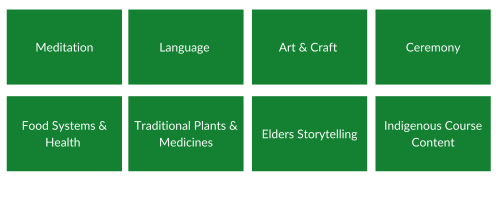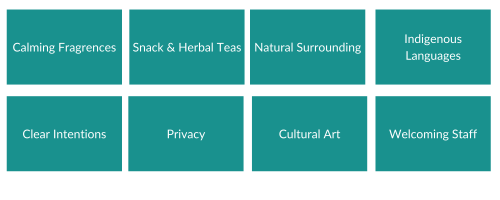The environmental scan & Community Engagement took place from May 2024 to October 2024 led by Mia McBryde, with guidance from Prof. Delormier and Prof. Humphries
Environmental Scan
Macdonald Campus Planning
The 2019 campus Master Plan highlights multiple spatial planning priorities that align directly with Skén:nen’s intentions. Overarching themes include: “Indigenous Symbolism and Presence” and “Sustainability and Open Spaces".
The Skén:nen project is now included in the Master plan revision with the name, location, and nature of the space depicted. Currently, there are three possible spaces on campus for Skén:nen.
McGill Calls to Action
McGill has committed to Truth and Reconciliation through its 52 Calls to Action promoting student recruitment, physical representation, academic programs, research and academics and capacity building.
The Skén:nen Project intends to support McGill’s goals of reconciliation and will directly respond to the following calls to action:
Call 26: Indigeneity and Public Spaces at McGill
Call 27: Cultural and Living Spaces for Indigenous Members of the McGill Community
The project also has the potential to respond to the following calls to action:
Call 15: Student Mentorship
Call 24: Elder-in-Residence Program
Call 25: Artists-in-Residence Program
Call 33: Field Courses and Land Based Pedagogy
Call 34: Language Revitalization and Documentation
Call 39: Indigenous Curriculum Content
Call 42: Community Partnership
Call 50: Communications and Awareness Building
Call 51: Establishing and Strengthening Partnership
Exemplary Indigenous Spaces
We identified thirty exemplary Indigenous spaces at university campuses across North America and Australia. These spaces were chosen as exemplary based on four elements: their design, their project intention, what the space offers users and their process of consultation
In order to improve our understanding of these space’s creation and consultation process, we interviewed representatives from 10 of our 30 university exemplars including:
- John Abbott College
- Okanagan College
- South Dakota State University
- University of Alberta
- University of British Columbia
- University of Saskatchewan
- University of Victoria
- University of Waterloo
- Western Sydney University
- Western Washington University
These are overarching themes that appeared across the interviews

If you would like to view our full report on the Environmental Scan and Community Engagement or the Exemplar Insighs and Recommendation Report please reach out to cine.aes [at] mcgill.ca
Community engagement
Individual interviews with key leadership figures at McGill
We completed interviews with 13 leadership figures at McGill, these interviews ranged from 30 to 90 minutes.
These interviews provided insight on community, staff and student engagement, Indigenous initiatives at McGill, communications and outreach opportunities, spatial design and planning as well as guiding values, goals and intentions for the project.
Community discussions
We completed one on one meetings with 10 community members, staff, faculty and students ranging from 45 - 120 minutes. These meetings detailed how Skén:nen can be embodied in a space, guiding intentions and values for the space and how to promote feelings of safety, welcoming and home.
These are some of the main outcomes from these meetings
What Values, other than Skén:nen, do you imagine guiding the space?

What intentions do you imagine guiding people's interactions with Skén:nen?

What do you imagine the space offering?
What programs do you imagine in the sapce facilitating?

What would mke the space feel safe and welcoming?

Community survey
Our survey asked 23 participants to share their input on how Skén:nen can feel safe and welcoming, what values and principles they would like to guide the space and their priorities for Skén:nen.
These are some of the main outcomes
What values and principles would you like to guide Skén:nen
Respect
Collaboration
Welcoming
Inclusivity & Open Mindedness
Knowledge sharing
Educational Decolonization
Cultural Integrity
Reconnection
What does having an Indigenous space on campus mean to you?
Having a space that…
Respects and centralizes Indigenous culture and ways of knowing
Is welcome, safe and free of discrimination
Increases diversity and inclusion in the institution
Provides opportunities to get in touch with one’s culture
Promotes the visibility of Indigenous Peoples on campus
Recognizes Indigenous rights
If you would like to view our full report on the Environmental Scan and Community Engagement please reach out to cine.aes [at] mcgill.ca

